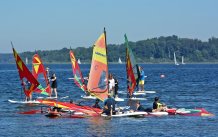Articles

Research will study the impact of sport on marine environments
Alumni fund research into mitigating impacts of sport and leisure in the marine environment
Scientists know that light, litter and noise are all major stressors on marine life but we don’t yet have a full understanding of their combined and comparative effects on the environment.
This is set to change thanks to two Exeter alumni. Theresa (Spanish, 1983) and Mike Laflin (Economics and Geography, 1981), have funded the ‘T&M Laflin Global Sports PhD Studentship’ which aims to enhance our knowledge of the combined effects of these stressors.
The research will gather data from sporting events in or on the water, as well as leisure boating, tourism and beach activities. Using both lab and field studies, the project will look at the impact of these activities on the environment and attempt to create best practice guidance across aquatic sports events and beyond.
Mike said: “I’ve worked in the sports industry for 30 years, providing market intelligence and information services and a few years ago I started to measure the impact of sporting events on host cities and nations. I’m excited to support this new research so that we can understand more about how our activities impact the environment and how we can mitigate against any negative effects.”
Theresa said: “We are very excited to be able to support all the wonderful work that the university is doing in the area of marine research, and for increasing our awareness of the detrimental impact we have on our environment.”
The PhD project will be supervised by Tamara Galloway, Professor of Ecotoxicology at Exeter, who conducts research into the human health effects of pollutants, particularly micro-plastics in water. And also Steve Simpson, Associate Professor in Marine Biology and Global Change, who has shown that man-made noise is having a detrimental effect on the marine world.
Steve said: “Noise from offshore construction, shipping and motorboats all change the ocean soundscape, disrupting acoustic communication, robbing animals of fundamental sensory information and causing stress. However, working with industry we have found that by managing when and where noise is made, and developing new technology to reduce the noise, we can mitigate the impacts of noise. Finding solutions to reduce the impacts of sporting activities will further help to protect the marine environment.”
All life on earth depends on the oceans for survival but they are under increasing threat from plastic pollution, overfishing, and climate change. A recent UN report highlighted the devastating impact of human activity on the natural world, with one million animal and plant species now threatened with extinction. In the report, just 3% of the world's oceans were described as being ‘free from human pressure in 2014’. These trends can be halted, but it will take ‘transformative change’ in every aspect of how humans interact with nature.
Tamara said: “We’ll be looking at all forms of pollution both from everyday leisure activities and major sporting events. Investigating specific events gives us the opportunity to measure environmental quality before and after the event, and to return after a period of time to assess recovery. Such an event could be seen as an ‘acute stressor’. Then we’ll also assess ongoing sporting activities, akin to a ‘chronic stressor’ and will try to compare and contrast different types of impact.”
Mike will also be acting as an advisor on the project, utilising his sporting data experience. The aim is to develop solutions that are commercially viable as well as positive for the environment.
Theresa and Mike’s donation is part of the University of Exeter’s ‘Making the Exceptional Happen’ Campaign, which aims to raise £60 million by the end of 2020. Funds raised support vital research in areas such as the environment and medicine, as well as supporting students to achieve their potential at Exeter. Currently the total stands at £56.3 million, 94% of the target.
Date: 25 September 2019
